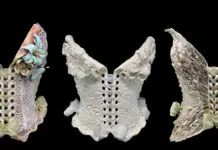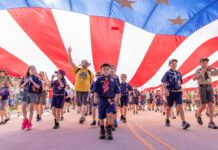Technology is often only available for certain people: those with the resources. But these aren’t the only people who have creative ideas, of course. Others just need access to the advanced equipment to make their ideas a reality.
The nonprofit Fab Lab Tulsa is beginning to change this.
Executive director Nathan Pritchett describes the Massachusetts Institute of Technology (MIT)-chartered fabrication laboratory as a place that provides the community with 21st-century tools, equipment and resources.
“It’s the kind of digital fabrication equipment that individuals typically wouldn’t have access to,” Pritchett says.
The community workspace is available for anyone, from businessmen developing projects for companies to artists designing a new piece. The organization is a 501(c)3 primarily funded through foundations, grants and individual contributions.
“The Fab Lab is an amazing resource for Tulsa and northeastern Oklahoma,” Pritchett says. “Every middle school, high school and college student in Tulsa has access to the same tools and equipment as a student at MIT. So does any person from the community and any business.”
The Tulsa lab opened in September 2011, and it’s part of a model that includes more than 100 locations on five continents. This particular location is slightly different, however, because it is not associated with a university or technical school, Pritchett says.
“We are an independent community center model, similar to the most successful European labs in Amsterdam, Barcelona and Manchester,” Pritchett says. “This means the lab is open to not just students and educators, but also hobbyists, tinkerers, artists, engineers, inventors, entrepreneurs – anyone.”
The lab is connected to the global network, as are the other labs chartered by MIT. It adheres to the same core values and shares a common set of tools, Pritchett says.
To join Fab Lab Tulsa, an individual, corporation or nonprofit pays a membership fee, which includes an orientation course and instruction on the equipment and software. From there, members not only have access to the equipment, but can also reserve machines online and take software tutorials.
Allison Lackner, education coordinator at Fab Lab Tulsa, develops all the curriculum and educational programming for children and families, she says.
“I get to teach kids how to use these machines in a fun and educational way,” Lackner says. “The programming is STEAM-based (science, technology, engineering, art and math); however, I want to incorporate history and other subjects as well to create programming that will benefit everyone.”
Lackner says that as an artist and an educator, she loves being able to come in to the lab every day to make something.
“I get to see and be inspired by what people are making here, and I get to inspire kids to come here and become makers, too,” Lackner says.
In addition to Pritchett and Lackner, the lab staff is rounded out by lab manager Dan Moran and lab technician Andrew Harmon.
Pritchett says that the staff has no idea from week to week what projects will come through the door.
“We see everything, from small, personal projects to rapid prototypes for global corporations, and everything in between,” he says. “We have members from a very large spectrum of backgrounds, skills and experiences.”
Since the lab opened in 2011, Pritchett adds that it has seen an explosion in the scale and sophistication of projects as lab members’ skills have grown.
Fab Lab member Derek Tarvin says that he first received his membership as a gift because he has always enjoyed tinkering with things and needed a creative outlet.
“I have used the lab to create things that I use with my gaming group as well as explore ideas that I have always wondered about,” Tarvin says.
One project example of Tarvin’s was a small, edge-lit LED sign powered by a watch battery, designed and constructed in one afternoon.
“Most recently, I have been working on 3-D prototypes for some jewelry designs that I hope to cast in metal in the future,” he says.
Tarvin advises that once a member joins the Fab Lab, he or she should start and execute a project, no matter whether the idea is perfect or not. He also says that members shouldn’t be intimidated by the equipment.
“Or, just come by the lab on a Saturday afternoon and see what everyone is making,” he says. “In one corner, people may be working on a quad-copter while someone else is making stickers on the vinyl cutter.”
Fab Lab Tulsa equipment includes a ShopBot CNC router, an Epilog Laser Cutter, a Roland Mini-Mill, a Roland Vinyl Cutter, an electronics workstation, two MakerBot 3-D printers and a commercial-quality Object Eden 3-D printer. The lab provides basic materials, but advises members to bring their own things for larger projects.
“Becoming a maker is really pretty easy,” Pritchett says. “You just need to come in and get started.”

























